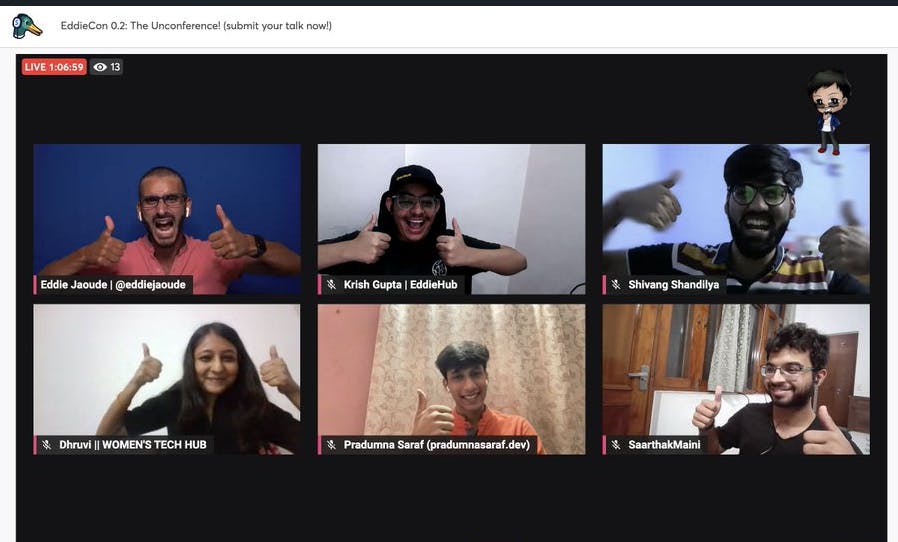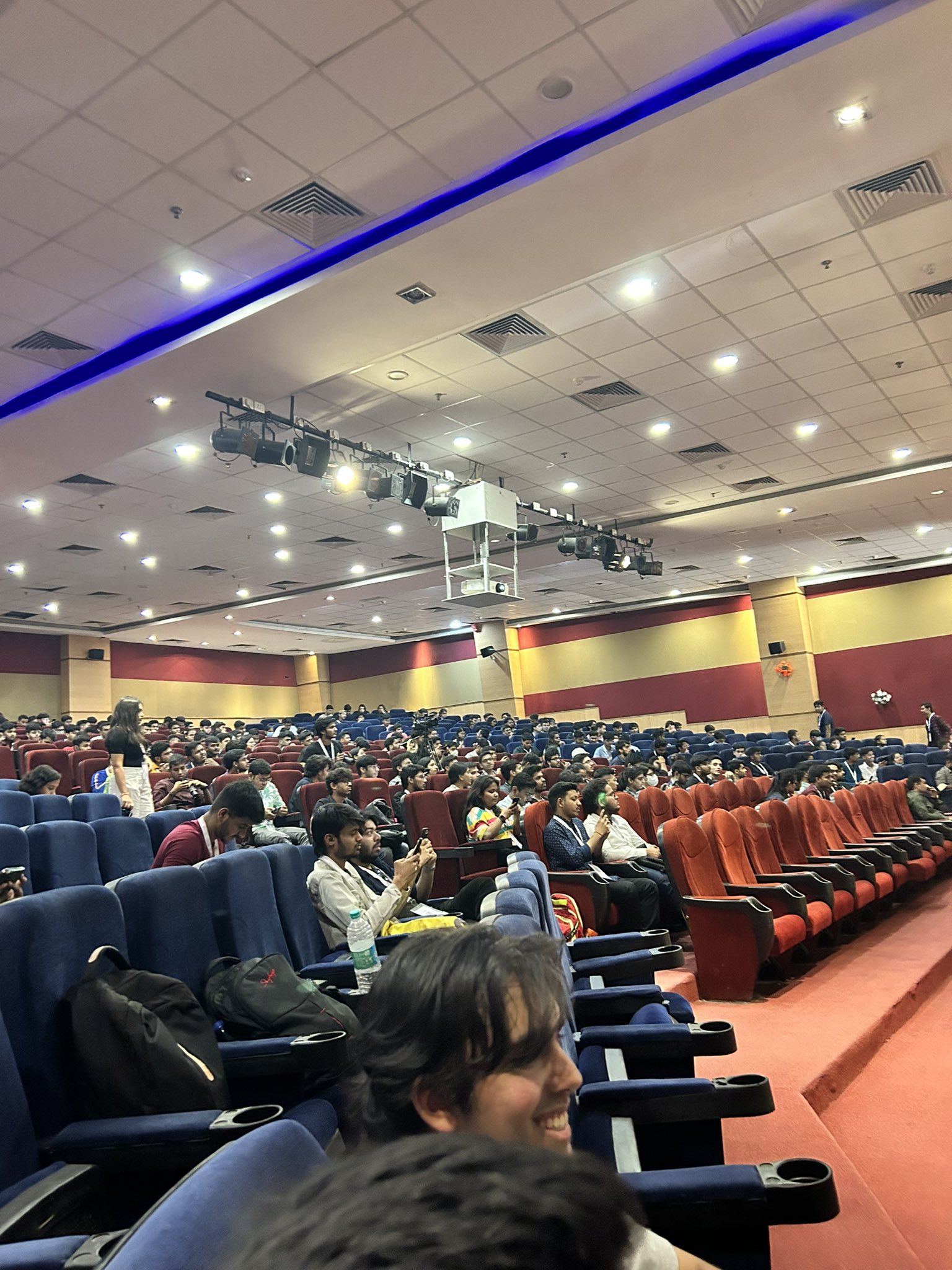Tech Communities: Amplifying Innovation and Collaboration
Where Ideas Converge, Skills Flourish, and Dreams Become Reality
Hey there!👋
Do you want a Job? An Internship? An Awesome Network? A Nice Career? Amazing Skills? Guidance from Industry Experts?
Well, all of this can be achieved by "Contributing, Collaborating and Learning In Tech Communities" and you're going to learn everything you need to know about it, right here!
What are Tech Communities?
Tech communities are groups of individuals who come together to share knowledge, collaborate, and engage in discussions related to technology.
These communities can be both online and offline, serving as platforms for learning, networking, and fostering innovation in the tech industry.
Tech communities are comprised of various professionals, including software developers, engineers, designers, entrepreneurs, enthusiasts, and researchers.
By participating in tech communities, individuals can expand their knowledge and skills, find mentorship and career opportunities, gain exposure to the industry, and build valuable connections.
These communities play a crucial role in fostering a sense of belonging, professional growth, and collective advancement in the ever-evolving world of technology.
Benefits Of Participating In Tech Communities
Participating in tech communities offers numerous benefits for individuals in the tech industry.
Knowledge Sharing and Learning: Tech communities provide a platform for sharing insights, experiences, and knowledge with peers. By actively participating in discussions, asking questions, and contributing expertise, individuals can expand their understanding of various tech topics and stay updated on the latest trends and advancements.
Networking Opportunities: Tech communities are excellent networking hubs where professionals can connect with like-minded individuals, industry experts, and potential collaborators. Building a strong network within these communities can lead to valuable partnerships, mentorship, job opportunities, and even entrepreneurial ventures.
Career Advancement: Engaging in tech communities can significantly boost career growth. Through networking, individuals may come across job openings, receive referrals, and gain access to exclusive career development resources. Furthermore, participating in community events and contributing to open-source projects can enhance one's professional reputation and increase visibility in the industry.
Collaboration and Project Opportunities: Tech communities often serve as a breeding ground for collaboration on projects, whether they are open-source initiatives, hackathons, or side projects. By working alongside others in these communities, individuals can enhance their teamwork skills, gain exposure to different perspectives, and create meaningful contributions to shared goals.
Supportive Environment: Tech communities foster a supportive and inclusive environment where individuals can seek guidance, advice, and support. It's a space where newcomers can find mentors, individuals can receive feedback on their work, and people can find solutions to technical challenges.
Personal Growth and Development: Active involvement in tech communities can lead to personal growth and development. By engaging with diverse professionals, attending workshops or webinars, and participating in community-led initiatives, individuals can enhance their communication skills, leadership abilities, and problem-solving capabilities.
Inspiration and Motivation: Being part of a tech community can be highly motivating and inspiring. Seeing the accomplishments, innovations, and successes of others within the community can spark new ideas, fuel creativity, and instill a sense of enthusiasm for continuous learning and improvement.
Access to Resources and Tools: Tech communities often provide access to a wealth of resources, including educational materials, tutorials, coding libraries, and industry news. Members can benefit from shared resources, recommended tools, and best practices, accelerating their learning and development.
Types Of Tech Communities
Online Communities:
Forums and Discussion Boards: Platforms like Stack Overflow, Reddit, and specialized forums provide spaces for asking questions, seeking advice, and engaging in discussions on specific tech topics.
Social Media Groups: Tech-focused groups on platforms like Showwcase, Facebook, LinkedIn, and Slack allow professionals to connect, share resources, and exchange insights.
Specialized Platforms: Online platforms dedicated to tech communities, such as GitHub for open-source collaboration, Showwcase for developer discussions, and Behance for design communities.
Local Communities:
Meetups and User Groups: Regular gatherings of tech enthusiasts in local areas where individuals share knowledge, discuss industry trends, and network with fellow professionals.
Hackathons: Intensive coding events where participants collaborate on projects, solve challenges, and showcase their skills within a limited timeframe.
Tech Conferences: Large-scale events that bring together professionals from various tech fields for keynote speeches, workshops, and networking opportunities.
Open-Source Communities:
Open-Source Projects: Communities centered around collaborating on and contributing to open-source software projects. Platforms like GitHub and GitLab serve as hubs for developers to share code, address issues, and collaborate on projects.
Developer Communities: Communities specifically focused on promoting and supporting open-source development, such as the Python Software Foundation or the Apache Software Foundation.
Finding and Joining Tech Communities
Finding and joining tech communities can be an exciting and enriching experience. Here are some steps you can take to discover and become part of tech communities:
Identify Your Interests: Determine the specific areas of technology that interest you the most. Whether it's web development, artificial intelligence, cybersecurity, or data science, narrowing down your focus will help you find communities that align with your passions.
Research Online Platforms: Look for online platforms that host tech communities and discussions. Websites like Stack Overflow, Reddit, GitHub, LinkedIn Groups, and specialized forums offer a wealth of knowledge and opportunities for engagement. Explore these platforms and search for communities relevant to your interests.
Attend Local Meetups and Events: Check for local tech meetups, user groups, and events happening in your area. Websites like Meetup.com, Eventbrite, or tech-specific directories can help you discover local gatherings where you can connect with like-minded individuals face-to-face.
Leverage Social Media: Utilize social media platforms such as Twitter, Facebook, and LinkedIn to find tech communities and groups. Follow influential individuals, companies, and organizations in your field of interest, and engage with their content. Join relevant groups and participate in discussions to expand your network.
Engage in Online Courses and Bootcamps: Online learning platforms and coding bootcamps often have built-in communities where students can connect with fellow learners, instructors, and alumni. Take advantage of these communities to seek support, collaborate on projects, and expand your network.
Participate in Hackathons and Challenges: Attend hackathons, coding challenges, or online competitions related to your interests. These events provide opportunities to collaborate with other participants, showcase your skills, and potentially connect with mentors or industry professionals.
Contribute to Open-Source Projects: Engage with open-source communities by contributing to projects on platforms like GitHub. You can start by finding projects aligned with your skills and interests, and then join their communities to collaborate and learn from other contributors.
Once you find tech communities that resonate with you, actively participate in discussions, ask questions, share your knowledge, and contribute to the community. Building relationships and showing your genuine interest will help you gain more from your involvement.
Engaging In Communities
Start by Lurking and Listening: When joining a new tech community, take some time to observe and understand the community dynamics, ongoing discussions, and cultural norms. This allows you to get a sense of the community's values and topics of interest.
Introduce Yourself: Once you feel comfortable, introduce yourself to the community. Share a brief background about your interests, skills, and what you hope to gain from participating in the community. This helps others get to know you and opens the door for potential connections.
Contribute Meaningfully: Engage in discussions by sharing insights, asking thoughtful questions, and offering solutions to problems when possible. Provide value to the community through your expertise and experiences. Remember to be respectful and considerate in your interactions.
Participate in Events and Activities: Attend meetups, webinars, workshops, or hackathons organized by the community. Actively participate, ask questions, and collaborate with others. These events provide excellent opportunities to learn, network, and contribute to the community's projects or initiatives.
Seek Help and Give Help: Don't hesitate to ask for help or guidance when you encounter challenges or have questions. Tech communities are often supportive and willing to assist. Likewise, offer your help and expertise to others when you can. Contributing to the success and growth of others fosters a sense of camaraderie and strengthens the community.
Share Resources and Insights: If you come across useful articles, tutorials, or tools, share them with the community. This demonstrates your willingness to contribute and helps others in their learning journeys. Sharing your insights, experiences, and lessons learned can also spark valuable discussions.
Organize or Participate in Collaborative Projects: Join community-driven projects, whether they are open-source initiatives, hackathons, or collaborations on side projects. Working together with other community members allows for skill-building, knowledge sharing, and networking.
Be Respectful and Inclusive: Treat all community members with respect, regardless of their backgrounds, experiences, or skill levels. Foster an inclusive environment where diverse voices are heard and valued. Avoid discriminatory or derogatory language, and encourage constructive and positive interactions.
Build Relationships: Engage in conversations, connect with individuals who share similar interests, and nurture relationships within the community. This can lead to valuable collaborations, mentorship opportunities, and long-lasting professional connections.
Give Back to the Community: As you grow and gain experience, consider giving back to the community. This could involve mentoring newcomers, organizing events or workshops, sharing your knowledge through tutorials or blog posts, or contributing to open-source projects. By actively contributing, you help sustain and strengthen the community for future members.
Loved These Communities!
GrowInCommunity

I was introduced to the GrowInCommunity via Twitter when people in my network started interacting with an amazing guy, Akshay who is the founder of the GrowInCommunity.
This community is perfect for everyone who wants to build a career in the Tech Industry.
I've had a wonderful time interacting with a diverse set of talented and experienced people!
This community is full of positive vibes, ambitious learners and amazing people! I would highly recommend joining this community and getting involved!
See you there!😁
The CloudOps Community

The CloudOps Community is fantastic!
This community is mainly for DevOps Engineers/SREs/Cloud Engineers who want to level up in their career and want to gain some extremely rare and valuable skills!
The Community is currently having the #10WeeksOfCloudOps challenge where we make projects related to current in-demand Cloud Technologies such as AWS,GCP and Azure along with Docker, Kubernetes, Terraform, etc.
I would highly recommend checking this community out if you want to upskill and excel in your tech career.
EddieHub

EddieHub Community founded by Eddie is one of the most well-known Tech Communities there is!
Full of amazing tech enthusiasts, this is the perfect tech community to Get Started With Open Source.
I've met many lovely people here in this community and have had a lovely experience!
WeMakeDevs
The WeMakeDevs community founded by Kunal Kushwaha is a game changer. Along with amazing events, community meets, mentorships, content, etc., I have personally learned a lot from the community!
This was one of the first communities I started interacting with and I was introduced to the amazing world of Open Source via this community itself.
I would definitely recommend checking it out!
Virtual Tech School(VTS)
Virtual Tech School Community, founded by Apoorv Goyal is one of the best communities I have been a part of. I make sure to attend the weekly community meetings to practice my Public Speaking Skills and meet new people in the tech industry.
It's an active community, bringing in many new events which I would highly recommend participating in!
Conclusion
In this blog post, we got introduced to the concept of "Contributing, Collaborating and Learning In Tech Communities" along with its benefits and best practices.
That's it for now. Did you like this blog? Please let me know.
You can Buy Me a Coffee if you want to and please don't forget to follow me on Youtube, Twitter, and LinkedIn also.
Happy Learning!


